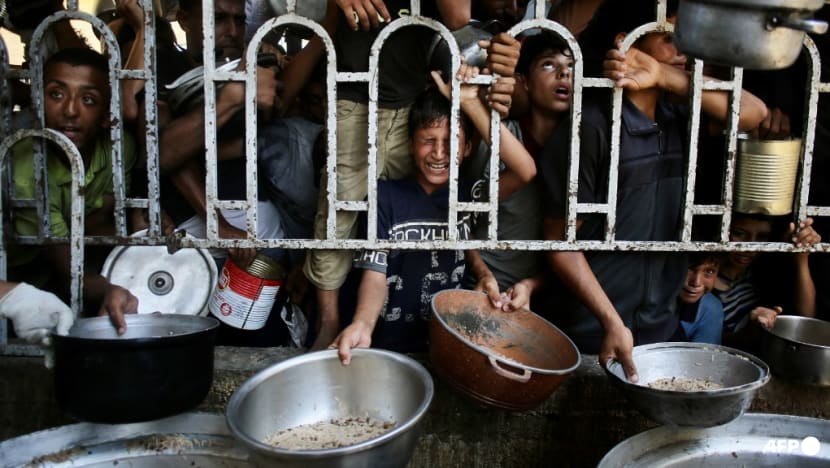World
Israel Eases Gaza Blockade as Humanitarian Crisis Deepens

Israel has taken steps to partially lift its aid blockade of Gaza as international pressure mounts regarding the worsening humanitarian crisis in the region. The United Arab Emirates and Jordan successfully airdropped 25 tonnes of food and humanitarian supplies on July 27, 2023. In addition, Israel announced daily pauses in military strikes and the opening of humanitarian corridors to facilitate United Nations aid deliveries. Despite these measures, the situation remains dire, with the United Nations estimating that Gaza requires between 500 to 600 trucks of aid per day, while only 70 trucks have been allowed into the area since May 19, 2023.
UN emergency relief chief Tom Fletcher has described the next few days as “make or break” for humanitarian agencies trying to assist over 2 million Gazans facing “famine-like conditions.” Currently, a third of the population has gone without food for several days, and around 90,000 women and children urgently need treatment for acute malnutrition. Local health authorities have reported 147 deaths from starvation, with 80 percent of those being children. Israeli Prime Minister Benjamin Netanyahu has asserted, without evidence, that “there is no starvation in Gaza,” a claim that has been met with rejection from global leaders, including U.S. President Donald Trump.
Famine expert Alex de Waal has characterized the situation as unprecedented, noting, “There’s no case of such minutely engineered, closely monitored, precisely designed mass starvation of a population as is happening in Gaza today.” While the UN has welcomed the partial lifting of the blockade, officials stress that the current aid allowed into Gaza is insufficient to avert a larger catastrophe.
Airdrops Criticized as Ineffective and Unsafe
The air-dropping of food supplies, although a response to urgent needs, has been criticized as a last resort due to its undignified and unsafe nature. The UN has reported injuries among civilians from falling packages, with one harrowing account shared by the Global Protection Cluster detailing a mother in Al Karama, east of Gaza City, whose home was struck by an airdropped pallet, causing her roof to collapse. She recounted, “Immediately following the impact, a group of people armed with knives rushed towards the house,” leaving her and her children in fear without assistance.
Moreover, air-dropped supplies are less efficient compared to truck deliveries. One truck can carry up to 20 tonnes of supplies and can reach Gaza more quickly if borders are opened to the required scale. Aid agencies emphasize that they have personnel and resources ready just one hour away at the border. Philippe Lazzarini, head of the UN Relief Works Agency (UNRWA) for Palestine, has labeled the air-drops a “distraction” and a “smokescreen,” indicating a lack of sustainable solutions for the crisis.
Urgent Need for Comprehensive Aid and Ceasefire
De Waal has highlighted the critical differences between starvation as a method of warfare and other war crimes, noting that it takes weeks of denying aid for starvation to manifest. For the 90,000 acutely malnourished women and children who require specialized care, the type of food being air-dropped is inadequate. These individuals need nutritional screening and access to fortified foods, which are not being provided through current aid efforts. The health system in Gaza, severely impacted by ongoing conflict, is unable to address the needs of severely malnourished individuals, who are at risk of “refeeding syndrome” when nutrients are reintroduced.
The UN has termed the limited reopening of aid deliveries as a potential “lifeline,” contingent on its continuation and expansion. Ciaran Donnelly from the International Rescue Committee has stated that the solution is “tragically simple”: Israel must fully open Gaza’s borders to allow aid and humanitarian personnel to enter freely. There must also be guarantees for safe conditions to ensure that aid reaches all groups, particularly vulnerable populations such as women, children, the elderly, and individuals with disabilities.
The people of Gaza are currently under intense scrutiny from the international community after enduring increasingly dehumanizing conditions for over 21 months. Two prominent Israeli human rights organizations have publicly described Israel’s actions in Gaza as “genocide,” a claim supported by mounting evidence from the UN and other experts. This classification triggers obligations under international law for states to act to prevent further atrocities.
Governments worldwide are urged to leverage their diplomatic influence to pressure Israel for the necessary aid access and to extend military pauses into a permanent ceasefire, which remains the only viable solution to avert famine and restore dignity to the people of Gaza.
-

 Lifestyle4 months ago
Lifestyle4 months agoHumanism Camp Engages 250 Youths in Summer Fest 2025
-

 Business5 months ago
Business5 months agoKenvue Dismisses CEO Thibaut Mongon as Strategic Review Advances
-

 Sports4 months ago
Sports4 months agoDe Minaur Triumphs at Washington Open After Thrilling Comeback
-

 Sports5 months ago
Sports5 months agoTupou and Daugunu Join First Nations Squad for Lions Clash
-

 Top Stories5 months ago
Top Stories5 months agoColombian Senator Miguel Uribe Shows Signs of Recovery After Attack
-

 World5 months ago
World5 months agoASEAN Gears Up for Historic Joint Meeting of Foreign and Economic Ministers
-

 Health4 months ago
Health4 months agoNew Study Challenges Assumptions About Aging and Inflammation
-

 Business5 months ago
Business5 months agoOil Prices Surge Following New EU Sanctions on Russia
-

 Entertainment4 months ago
Entertainment4 months agoDetaşe-Sabah Violin Ensemble Captivates at Gabala Music Festival
-

 Entertainment4 months ago
Entertainment4 months agoBaku Metro Extends Hours for Justin Timberlake Concert
-

 Top Stories5 months ago
Top Stories5 months agoRethinking Singapore’s F&B Regulations Amid Business Closures
-

 Business5 months ago
Business5 months agoU.S. House Approves Stablecoin Bill, Sends to Trump for Signature









